Psychosocial Development: Children Aged 2-5 Years, and Influences
VerifiedAdded on 2021/02/22
|6
|1743
|49
Report
AI Summary
This report examines psychosocial development in children aged 2-5 years, focusing on the cognitive, emotional, and social growth during this crucial period. It delves into Erik Erikson's stages of psychosocial development, highlighting the key crises and developmental tasks children face, from trust vs. mistrust to industry vs. inferiority. The report emphasizes the significant influence of parents, caregivers, and the external environment on a child's development, including the impact of both positive and negative experiences. It discusses the importance of providing children with supportive environments, including the role of nurses and community groups, to foster healthy development and address potential challenges such as toilet training issues. The report also touches upon non-normative events and their impact on a child's mental condition, concluding with the core actions of health groups to enhance healthy practices for children and their families.
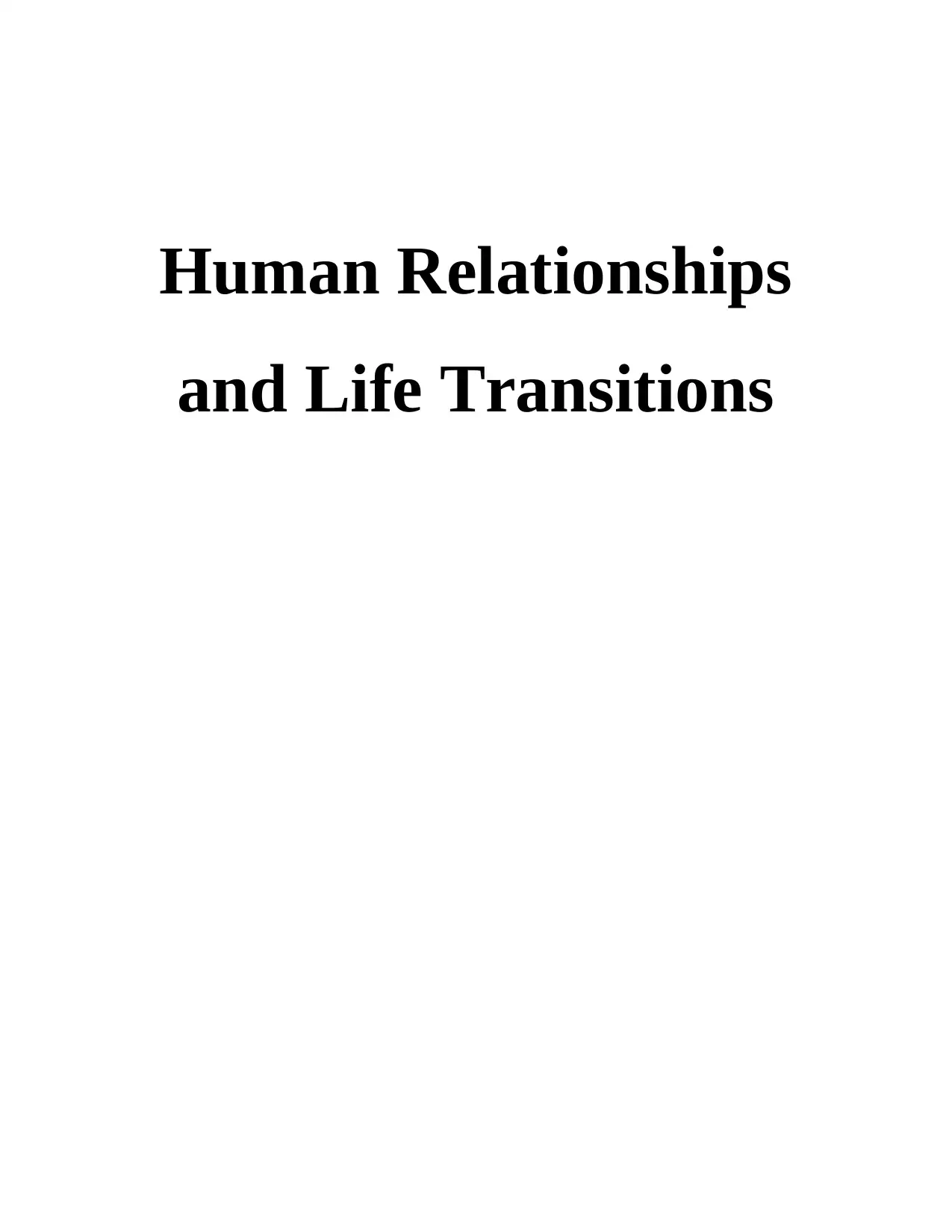
Human Relationships
and Life Transitions
and Life Transitions
Paraphrase This Document
Need a fresh take? Get an instant paraphrase of this document with our AI Paraphraser
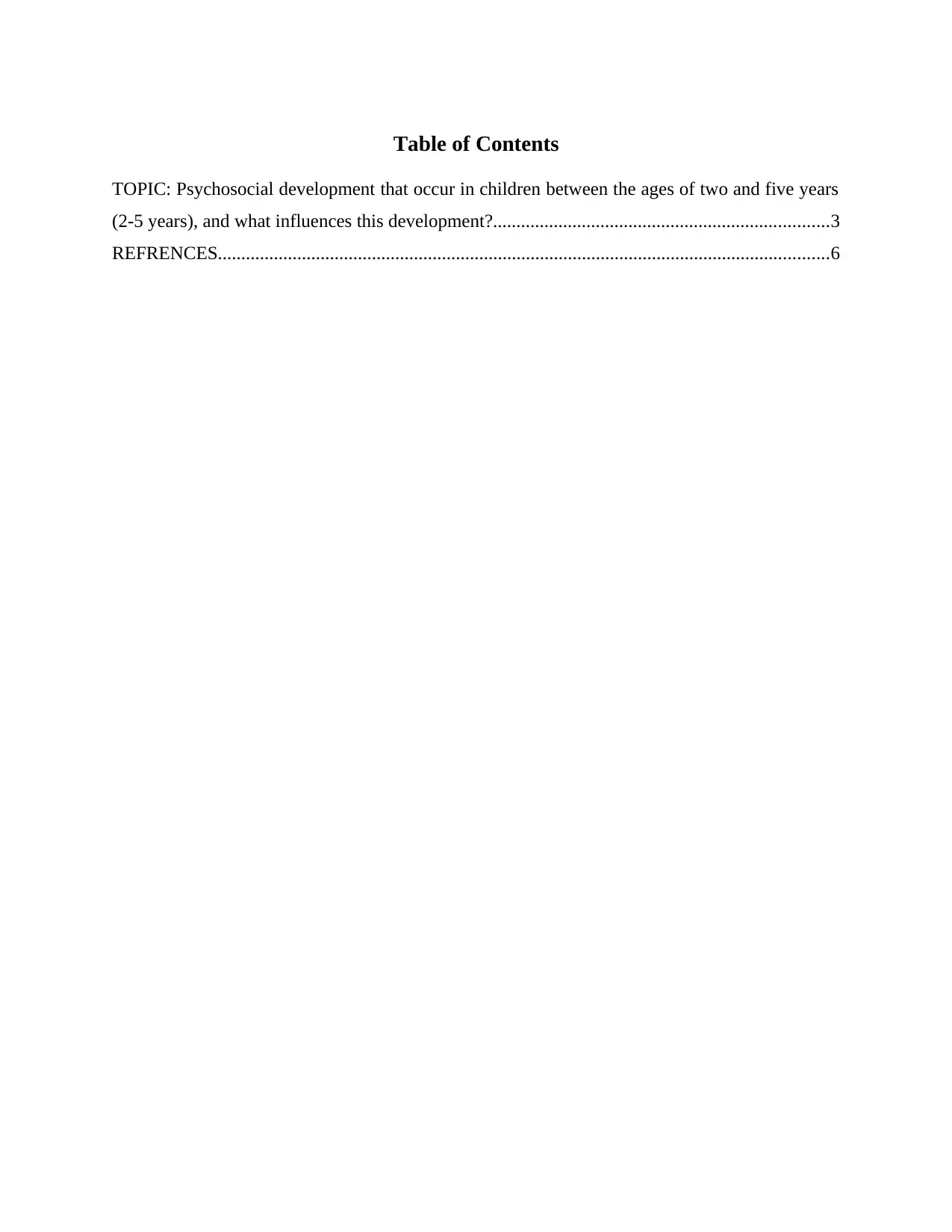
Table of Contents
TOPIC: Psychosocial development that occur in children between the ages of two and five years
(2-5 years), and what influences this development?........................................................................3
REFRENCES...................................................................................................................................6
TOPIC: Psychosocial development that occur in children between the ages of two and five years
(2-5 years), and what influences this development?........................................................................3
REFRENCES...................................................................................................................................6
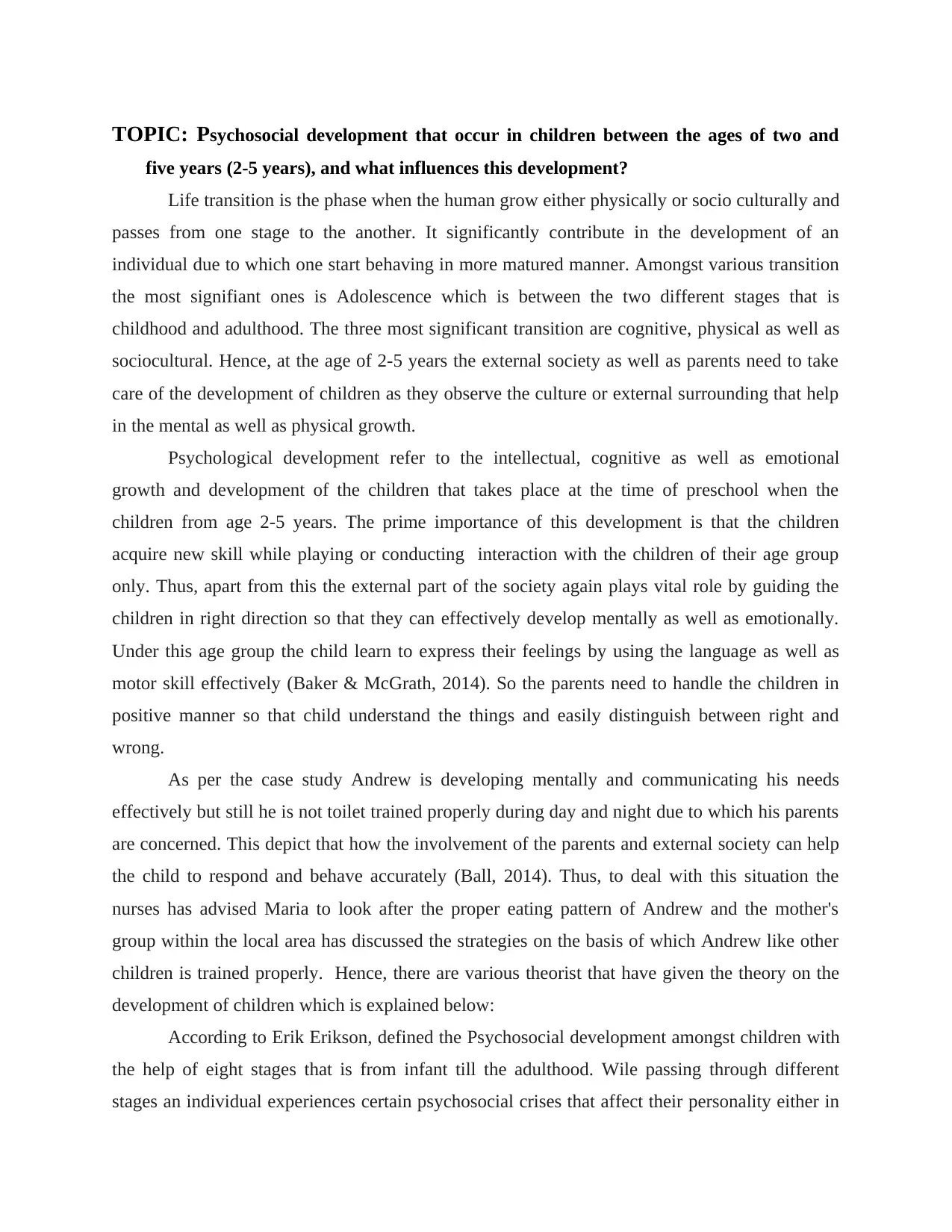
TOPIC: Psychosocial development that occur in children between the ages of two and
five years (2-5 years), and what influences this development?
Life transition is the phase when the human grow either physically or socio culturally and
passes from one stage to the another. It significantly contribute in the development of an
individual due to which one start behaving in more matured manner. Amongst various transition
the most signifiant ones is Adolescence which is between the two different stages that is
childhood and adulthood. The three most significant transition are cognitive, physical as well as
sociocultural. Hence, at the age of 2-5 years the external society as well as parents need to take
care of the development of children as they observe the culture or external surrounding that help
in the mental as well as physical growth.
Psychological development refer to the intellectual, cognitive as well as emotional
growth and development of the children that takes place at the time of preschool when the
children from age 2-5 years. The prime importance of this development is that the children
acquire new skill while playing or conducting interaction with the children of their age group
only. Thus, apart from this the external part of the society again plays vital role by guiding the
children in right direction so that they can effectively develop mentally as well as emotionally.
Under this age group the child learn to express their feelings by using the language as well as
motor skill effectively (Baker & McGrath, 2014). So the parents need to handle the children in
positive manner so that child understand the things and easily distinguish between right and
wrong.
As per the case study Andrew is developing mentally and communicating his needs
effectively but still he is not toilet trained properly during day and night due to which his parents
are concerned. This depict that how the involvement of the parents and external society can help
the child to respond and behave accurately (Ball, 2014). Thus, to deal with this situation the
nurses has advised Maria to look after the proper eating pattern of Andrew and the mother's
group within the local area has discussed the strategies on the basis of which Andrew like other
children is trained properly. Hence, there are various theorist that have given the theory on the
development of children which is explained below:
According to Erik Erikson, defined the Psychosocial development amongst children with
the help of eight stages that is from infant till the adulthood. Wile passing through different
stages an individual experiences certain psychosocial crises that affect their personality either in
five years (2-5 years), and what influences this development?
Life transition is the phase when the human grow either physically or socio culturally and
passes from one stage to the another. It significantly contribute in the development of an
individual due to which one start behaving in more matured manner. Amongst various transition
the most signifiant ones is Adolescence which is between the two different stages that is
childhood and adulthood. The three most significant transition are cognitive, physical as well as
sociocultural. Hence, at the age of 2-5 years the external society as well as parents need to take
care of the development of children as they observe the culture or external surrounding that help
in the mental as well as physical growth.
Psychological development refer to the intellectual, cognitive as well as emotional
growth and development of the children that takes place at the time of preschool when the
children from age 2-5 years. The prime importance of this development is that the children
acquire new skill while playing or conducting interaction with the children of their age group
only. Thus, apart from this the external part of the society again plays vital role by guiding the
children in right direction so that they can effectively develop mentally as well as emotionally.
Under this age group the child learn to express their feelings by using the language as well as
motor skill effectively (Baker & McGrath, 2014). So the parents need to handle the children in
positive manner so that child understand the things and easily distinguish between right and
wrong.
As per the case study Andrew is developing mentally and communicating his needs
effectively but still he is not toilet trained properly during day and night due to which his parents
are concerned. This depict that how the involvement of the parents and external society can help
the child to respond and behave accurately (Ball, 2014). Thus, to deal with this situation the
nurses has advised Maria to look after the proper eating pattern of Andrew and the mother's
group within the local area has discussed the strategies on the basis of which Andrew like other
children is trained properly. Hence, there are various theorist that have given the theory on the
development of children which is explained below:
According to Erik Erikson, defined the Psychosocial development amongst children with
the help of eight stages that is from infant till the adulthood. Wile passing through different
stages an individual experiences certain psychosocial crises that affect their personality either in
⊘ This is a preview!⊘
Do you want full access?
Subscribe today to unlock all pages.

Trusted by 1+ million students worldwide
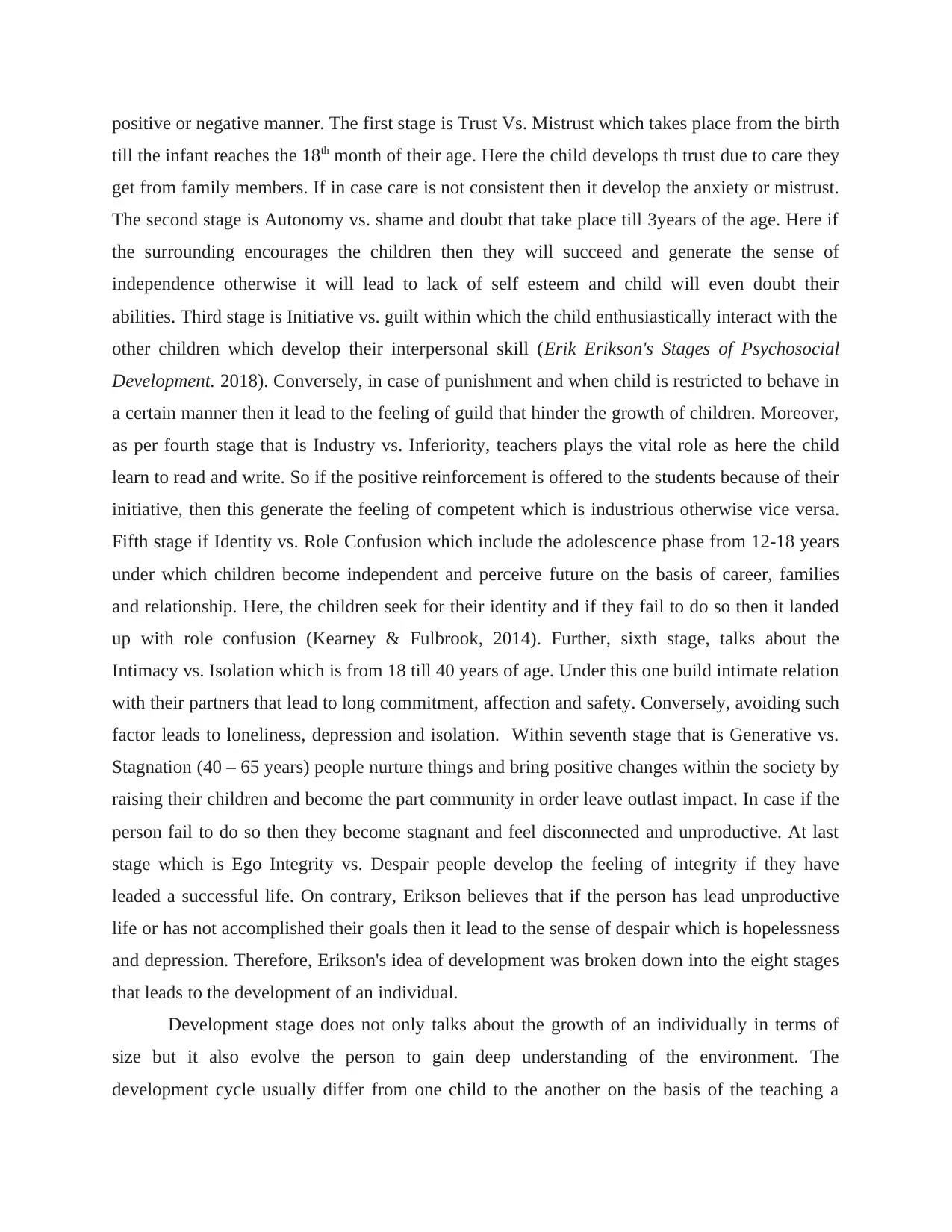
positive or negative manner. The first stage is Trust Vs. Mistrust which takes place from the birth
till the infant reaches the 18th month of their age. Here the child develops th trust due to care they
get from family members. If in case care is not consistent then it develop the anxiety or mistrust.
The second stage is Autonomy vs. shame and doubt that take place till 3years of the age. Here if
the surrounding encourages the children then they will succeed and generate the sense of
independence otherwise it will lead to lack of self esteem and child will even doubt their
abilities. Third stage is Initiative vs. guilt within which the child enthusiastically interact with the
other children which develop their interpersonal skill (Erik Erikson's Stages of Psychosocial
Development. 2018). Conversely, in case of punishment and when child is restricted to behave in
a certain manner then it lead to the feeling of guild that hinder the growth of children. Moreover,
as per fourth stage that is Industry vs. Inferiority, teachers plays the vital role as here the child
learn to read and write. So if the positive reinforcement is offered to the students because of their
initiative, then this generate the feeling of competent which is industrious otherwise vice versa.
Fifth stage if Identity vs. Role Confusion which include the adolescence phase from 12-18 years
under which children become independent and perceive future on the basis of career, families
and relationship. Here, the children seek for their identity and if they fail to do so then it landed
up with role confusion (Kearney & Fulbrook, 2014). Further, sixth stage, talks about the
Intimacy vs. Isolation which is from 18 till 40 years of age. Under this one build intimate relation
with their partners that lead to long commitment, affection and safety. Conversely, avoiding such
factor leads to loneliness, depression and isolation. Within seventh stage that is Generative vs.
Stagnation (40 – 65 years) people nurture things and bring positive changes within the society by
raising their children and become the part community in order leave outlast impact. In case if the
person fail to do so then they become stagnant and feel disconnected and unproductive. At last
stage which is Ego Integrity vs. Despair people develop the feeling of integrity if they have
leaded a successful life. On contrary, Erikson believes that if the person has lead unproductive
life or has not accomplished their goals then it lead to the sense of despair which is hopelessness
and depression. Therefore, Erikson's idea of development was broken down into the eight stages
that leads to the development of an individual.
Development stage does not only talks about the growth of an individually in terms of
size but it also evolve the person to gain deep understanding of the environment. The
development cycle usually differ from one child to the another on the basis of the teaching a
till the infant reaches the 18th month of their age. Here the child develops th trust due to care they
get from family members. If in case care is not consistent then it develop the anxiety or mistrust.
The second stage is Autonomy vs. shame and doubt that take place till 3years of the age. Here if
the surrounding encourages the children then they will succeed and generate the sense of
independence otherwise it will lead to lack of self esteem and child will even doubt their
abilities. Third stage is Initiative vs. guilt within which the child enthusiastically interact with the
other children which develop their interpersonal skill (Erik Erikson's Stages of Psychosocial
Development. 2018). Conversely, in case of punishment and when child is restricted to behave in
a certain manner then it lead to the feeling of guild that hinder the growth of children. Moreover,
as per fourth stage that is Industry vs. Inferiority, teachers plays the vital role as here the child
learn to read and write. So if the positive reinforcement is offered to the students because of their
initiative, then this generate the feeling of competent which is industrious otherwise vice versa.
Fifth stage if Identity vs. Role Confusion which include the adolescence phase from 12-18 years
under which children become independent and perceive future on the basis of career, families
and relationship. Here, the children seek for their identity and if they fail to do so then it landed
up with role confusion (Kearney & Fulbrook, 2014). Further, sixth stage, talks about the
Intimacy vs. Isolation which is from 18 till 40 years of age. Under this one build intimate relation
with their partners that lead to long commitment, affection and safety. Conversely, avoiding such
factor leads to loneliness, depression and isolation. Within seventh stage that is Generative vs.
Stagnation (40 – 65 years) people nurture things and bring positive changes within the society by
raising their children and become the part community in order leave outlast impact. In case if the
person fail to do so then they become stagnant and feel disconnected and unproductive. At last
stage which is Ego Integrity vs. Despair people develop the feeling of integrity if they have
leaded a successful life. On contrary, Erikson believes that if the person has lead unproductive
life or has not accomplished their goals then it lead to the sense of despair which is hopelessness
and depression. Therefore, Erikson's idea of development was broken down into the eight stages
that leads to the development of an individual.
Development stage does not only talks about the growth of an individually in terms of
size but it also evolve the person to gain deep understanding of the environment. The
development cycle usually differ from one child to the another on the basis of the teaching a
Paraphrase This Document
Need a fresh take? Get an instant paraphrase of this document with our AI Paraphraser
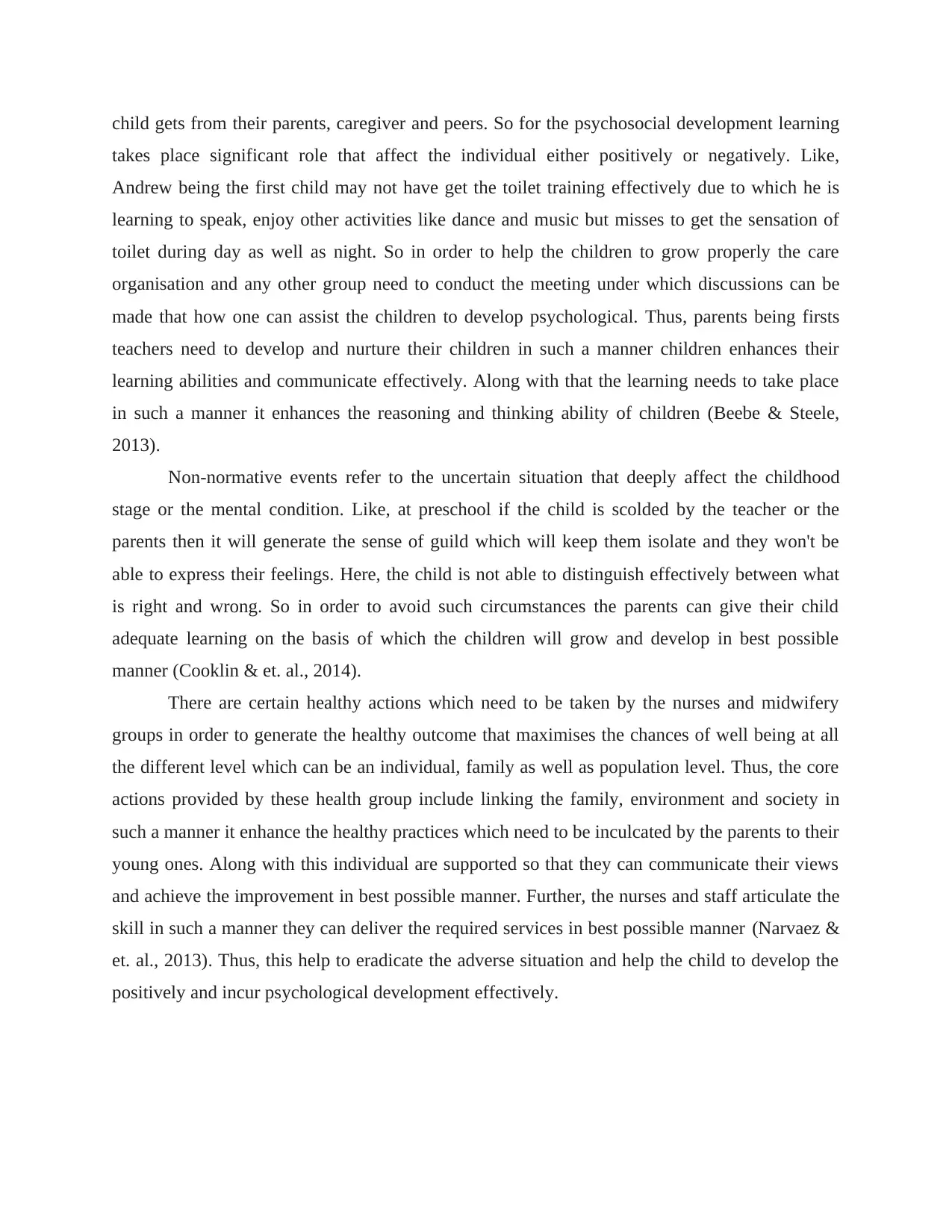
child gets from their parents, caregiver and peers. So for the psychosocial development learning
takes place significant role that affect the individual either positively or negatively. Like,
Andrew being the first child may not have get the toilet training effectively due to which he is
learning to speak, enjoy other activities like dance and music but misses to get the sensation of
toilet during day as well as night. So in order to help the children to grow properly the care
organisation and any other group need to conduct the meeting under which discussions can be
made that how one can assist the children to develop psychological. Thus, parents being firsts
teachers need to develop and nurture their children in such a manner children enhances their
learning abilities and communicate effectively. Along with that the learning needs to take place
in such a manner it enhances the reasoning and thinking ability of children (Beebe & Steele,
2013).
Non-normative events refer to the uncertain situation that deeply affect the childhood
stage or the mental condition. Like, at preschool if the child is scolded by the teacher or the
parents then it will generate the sense of guild which will keep them isolate and they won't be
able to express their feelings. Here, the child is not able to distinguish effectively between what
is right and wrong. So in order to avoid such circumstances the parents can give their child
adequate learning on the basis of which the children will grow and develop in best possible
manner (Cooklin & et. al., 2014).
There are certain healthy actions which need to be taken by the nurses and midwifery
groups in order to generate the healthy outcome that maximises the chances of well being at all
the different level which can be an individual, family as well as population level. Thus, the core
actions provided by these health group include linking the family, environment and society in
such a manner it enhance the healthy practices which need to be inculcated by the parents to their
young ones. Along with this individual are supported so that they can communicate their views
and achieve the improvement in best possible manner. Further, the nurses and staff articulate the
skill in such a manner they can deliver the required services in best possible manner (Narvaez &
et. al., 2013). Thus, this help to eradicate the adverse situation and help the child to develop the
positively and incur psychological development effectively.
takes place significant role that affect the individual either positively or negatively. Like,
Andrew being the first child may not have get the toilet training effectively due to which he is
learning to speak, enjoy other activities like dance and music but misses to get the sensation of
toilet during day as well as night. So in order to help the children to grow properly the care
organisation and any other group need to conduct the meeting under which discussions can be
made that how one can assist the children to develop psychological. Thus, parents being firsts
teachers need to develop and nurture their children in such a manner children enhances their
learning abilities and communicate effectively. Along with that the learning needs to take place
in such a manner it enhances the reasoning and thinking ability of children (Beebe & Steele,
2013).
Non-normative events refer to the uncertain situation that deeply affect the childhood
stage or the mental condition. Like, at preschool if the child is scolded by the teacher or the
parents then it will generate the sense of guild which will keep them isolate and they won't be
able to express their feelings. Here, the child is not able to distinguish effectively between what
is right and wrong. So in order to avoid such circumstances the parents can give their child
adequate learning on the basis of which the children will grow and develop in best possible
manner (Cooklin & et. al., 2014).
There are certain healthy actions which need to be taken by the nurses and midwifery
groups in order to generate the healthy outcome that maximises the chances of well being at all
the different level which can be an individual, family as well as population level. Thus, the core
actions provided by these health group include linking the family, environment and society in
such a manner it enhance the healthy practices which need to be inculcated by the parents to their
young ones. Along with this individual are supported so that they can communicate their views
and achieve the improvement in best possible manner. Further, the nurses and staff articulate the
skill in such a manner they can deliver the required services in best possible manner (Narvaez &
et. al., 2013). Thus, this help to eradicate the adverse situation and help the child to develop the
positively and incur psychological development effectively.
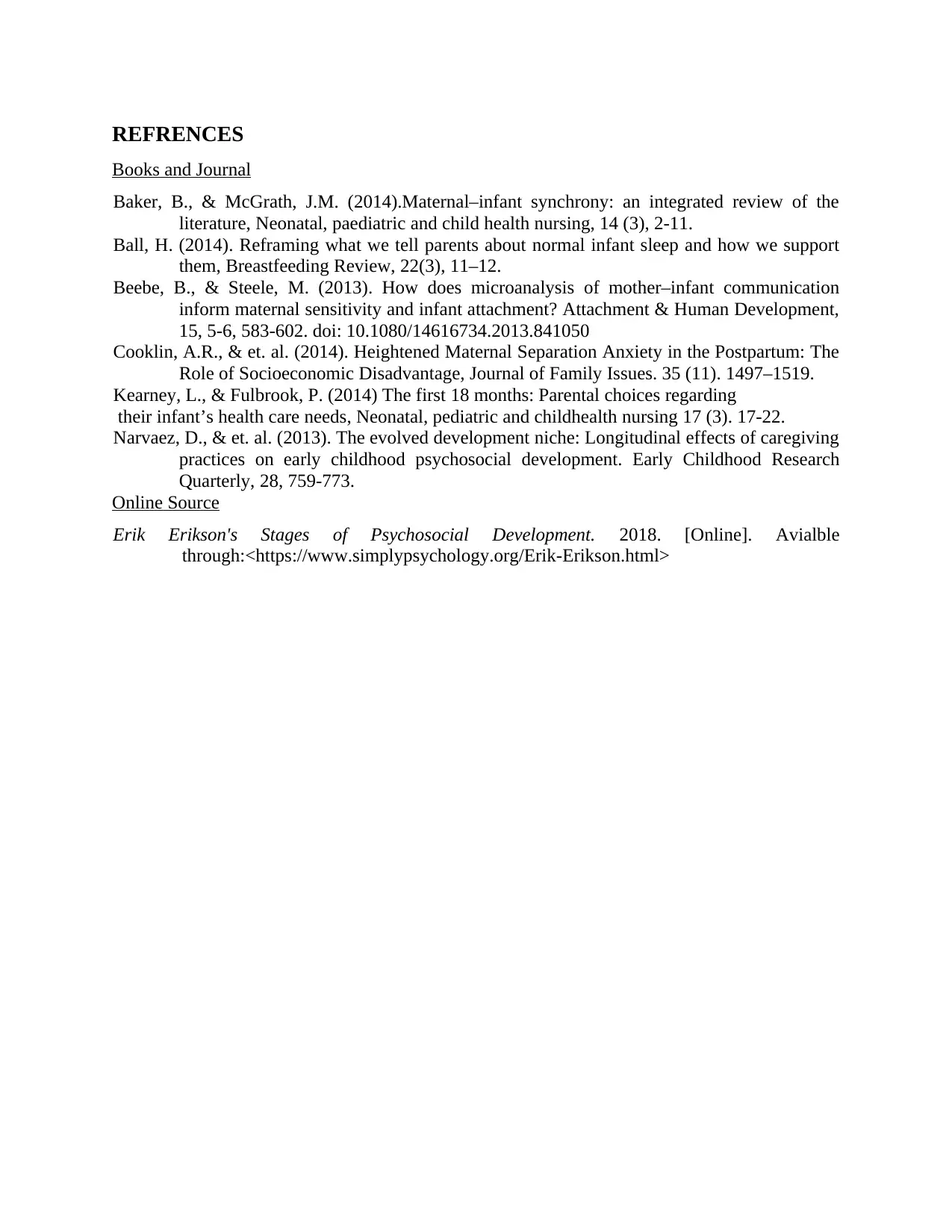
REFRENCES
Books and Journal
Baker, B., & McGrath, J.M. (2014).Maternal–infant synchrony: an integrated review of the
literature, Neonatal, paediatric and child health nursing, 14 (3), 2-11.
Ball, H. (2014). Reframing what we tell parents about normal infant sleep and how we support
them, Breastfeeding Review, 22(3), 11–12.
Beebe, B., & Steele, M. (2013). How does microanalysis of mother–infant communication
inform maternal sensitivity and infant attachment? Attachment & Human Development,
15, 5-6, 583-602. doi: 10.1080/14616734.2013.841050
Cooklin, A.R., & et. al. (2014). Heightened Maternal Separation Anxiety in the Postpartum: The
Role of Socioeconomic Disadvantage, Journal of Family Issues. 35 (11). 1497–1519.
Kearney, L., & Fulbrook, P. (2014) The first 18 months: Parental choices regarding
their infant’s health care needs, Neonatal, pediatric and childhealth nursing 17 (3). 17-22.
Narvaez, D., & et. al. (2013). The evolved development niche: Longitudinal effects of caregiving
practices on early childhood psychosocial development. Early Childhood Research
Quarterly, 28, 759-773.
Online Source
Erik Erikson's Stages of Psychosocial Development. 2018. [Online]. Avialble
through:<https://www.simplypsychology.org/Erik-Erikson.html>
Books and Journal
Baker, B., & McGrath, J.M. (2014).Maternal–infant synchrony: an integrated review of the
literature, Neonatal, paediatric and child health nursing, 14 (3), 2-11.
Ball, H. (2014). Reframing what we tell parents about normal infant sleep and how we support
them, Breastfeeding Review, 22(3), 11–12.
Beebe, B., & Steele, M. (2013). How does microanalysis of mother–infant communication
inform maternal sensitivity and infant attachment? Attachment & Human Development,
15, 5-6, 583-602. doi: 10.1080/14616734.2013.841050
Cooklin, A.R., & et. al. (2014). Heightened Maternal Separation Anxiety in the Postpartum: The
Role of Socioeconomic Disadvantage, Journal of Family Issues. 35 (11). 1497–1519.
Kearney, L., & Fulbrook, P. (2014) The first 18 months: Parental choices regarding
their infant’s health care needs, Neonatal, pediatric and childhealth nursing 17 (3). 17-22.
Narvaez, D., & et. al. (2013). The evolved development niche: Longitudinal effects of caregiving
practices on early childhood psychosocial development. Early Childhood Research
Quarterly, 28, 759-773.
Online Source
Erik Erikson's Stages of Psychosocial Development. 2018. [Online]. Avialble
through:<https://www.simplypsychology.org/Erik-Erikson.html>
⊘ This is a preview!⊘
Do you want full access?
Subscribe today to unlock all pages.

Trusted by 1+ million students worldwide
1 out of 6
Related Documents
Your All-in-One AI-Powered Toolkit for Academic Success.
+13062052269
info@desklib.com
Available 24*7 on WhatsApp / Email
![[object Object]](/_next/static/media/star-bottom.7253800d.svg)
Unlock your academic potential
Copyright © 2020–2026 A2Z Services. All Rights Reserved. Developed and managed by ZUCOL.





